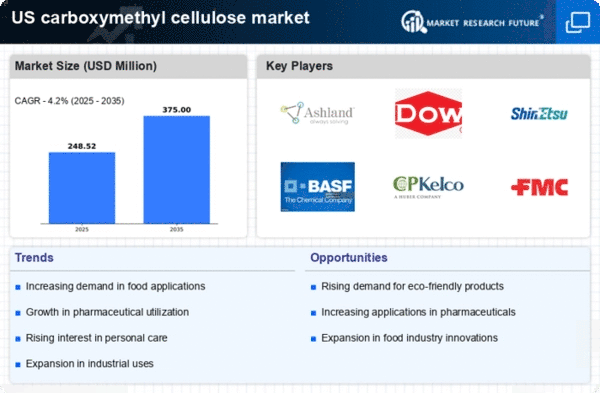The carboxymethyl cellulose market exhibits a dynamic competitive landscape characterized by innovation and strategic positioning among key players. Major companies such as Ashland Global Holdings Inc (US), Dow Chemical Company (US), and CP Kelco (US) are actively shaping the market through various strategies. Ashland Global Holdings Inc (US) focuses on enhancing its product portfolio through innovation, particularly in sustainable applications, which aligns with the growing demand for eco-friendly solutions. Meanwhile, Dow Chemical Company (US) emphasizes regional expansion and digital transformation, aiming to optimize its operations and improve customer engagement. CP Kelco (US) is also investing in partnerships to enhance its supply chain capabilities, thereby strengthening its market presence.The business tactics employed by these companies include localizing manufacturing and optimizing supply chains to respond swiftly to market demands. The competitive structure of the market appears moderately fragmented, with several players vying for market share. However, the collective influence of these key players is significant, as they drive advancements in technology and sustainability, which are becoming increasingly critical in the industry.
In October Ashland Global Holdings Inc (US) announced a partnership with a leading biotechnology firm to develop bio-based carboxymethyl cellulose products. This strategic move is likely to enhance Ashland's sustainability profile and cater to the rising consumer preference for environmentally friendly products. The collaboration may also position Ashland as a leader in innovative solutions within the market.
In September Dow Chemical Company (US) launched a new digital platform aimed at streamlining customer interactions and improving supply chain efficiency. This initiative reflects Dow's commitment to digital transformation, which is essential for maintaining competitiveness in a rapidly evolving market. By leveraging technology, Dow is expected to enhance its operational agility and responsiveness to customer needs.
In August CP Kelco (US) expanded its manufacturing capabilities by investing in a new facility in the Midwest. This expansion is anticipated to bolster CP Kelco's production capacity and improve its ability to meet growing demand in the food and pharmaceutical sectors. Such strategic investments are crucial for maintaining a competitive edge in a market that is increasingly focused on quality and reliability.
As of November current trends in the carboxymethyl cellulose market indicate a strong emphasis on digitalization, sustainability, and the integration of artificial intelligence. Strategic alliances are playing a pivotal role in shaping the competitive landscape, as companies seek to leverage each other's strengths to enhance their offerings. Looking ahead, it appears that competitive differentiation will increasingly hinge on innovation and technology, rather than solely on price. The focus on supply chain reliability and sustainable practices is likely to redefine how companies compete in this evolving market.

















